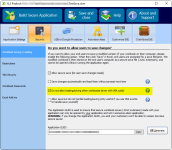I have realized about a potential gap in the protection of XLSPADLOCK that I would like to clarify.
If the Excel option “autosave” is activated then the original uncompiled Excel workbook is saved automatically by Windows in the defined path.
In my case my original workbook is Application.xlsb and after closing without saving Windows has saved a workbook called “Application(Unsaved-nnn)).xlsb” which is my original uncompiled workbook (nnn is a long number generated by Windows).
How is this possible? If this is happening in the client PC anyone can have my original workbook without the protection of XLSPADLOCK.
I have tested this issue with Windows 7 + Excel 2010 32 bits and Windows 10 + Exce 2016 32 bits.
My current XLSPADLOCK is V2.1
Can this be avoided unmarking the autosave option of Excel when generating the .EXE ?
If the Excel option “autosave” is activated then the original uncompiled Excel workbook is saved automatically by Windows in the defined path.
In my case my original workbook is Application.xlsb and after closing without saving Windows has saved a workbook called “Application(Unsaved-nnn)).xlsb” which is my original uncompiled workbook (nnn is a long number generated by Windows).
How is this possible? If this is happening in the client PC anyone can have my original workbook without the protection of XLSPADLOCK.
I have tested this issue with Windows 7 + Excel 2010 32 bits and Windows 10 + Exce 2016 32 bits.
My current XLSPADLOCK is V2.1
Can this be avoided unmarking the autosave option of Excel when generating the .EXE ?


